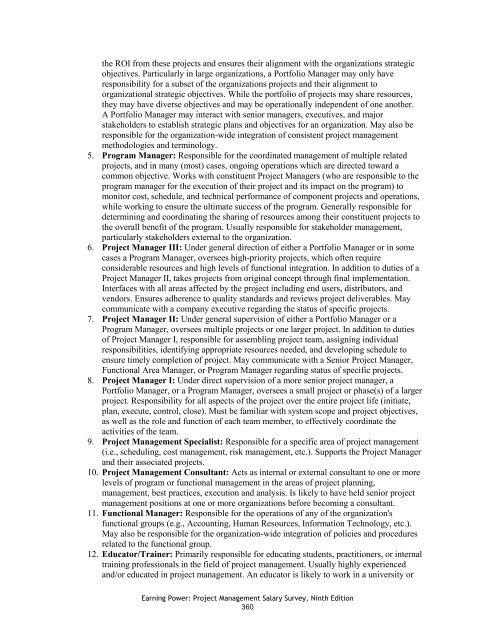Earning Power
1p4Cz9a
1p4Cz9a
Create successful ePaper yourself
Turn your PDF publications into a flip-book with our unique Google optimized e-Paper software.
the ROI from these projects and ensures their alignment with the organizations strategic<br />
objectives. Particularly in large organizations, a Portfolio Manager may only have<br />
responsibility for a subset of the organizations projects and their alignment to<br />
organizational strategic objectives. While the portfolio of projects may share resources,<br />
they may have diverse objectives and may be operationally independent of one another.<br />
A Portfolio Manager may interact with senior managers, executives, and major<br />
stakeholders to establish strategic plans and objectives for an organization. May also be<br />
responsible for the organization-wide integration of consistent project management<br />
methodologies and terminology.<br />
5. Program Manager: Responsible for the coordinated management of multiple related<br />
projects, and in many (most) cases, ongoing operations which are directed toward a<br />
common objective. Works with constituent Project Managers (who are responsible to the<br />
program manager for the execution of their project and its impact on the program) to<br />
monitor cost, schedule, and technical performance of component projects and operations,<br />
while working to ensure the ultimate success of the program. Generally responsible for<br />
determining and coordinating the sharing of resources among their constituent projects to<br />
the overall benefit of the program. Usually responsible for stakeholder management,<br />
particularly stakeholders external to the organization.<br />
6. Project Manager III: Under general direction of either a Portfolio Manager or in some<br />
cases a Program Manager, oversees high-priority projects, which often require<br />
considerable resources and high levels of functional integration. In addition to duties of a<br />
Project Manager II, takes projects from original concept through final implementation.<br />
Interfaces with all areas affected by the project including end users, distributors, and<br />
vendors. Ensures adherence to quality standards and reviews project deliverables. May<br />
communicate with a company executive regarding the status of specific projects.<br />
7. Project Manager II: Under general supervision of either a Portfolio Manager or a<br />
Program Manager, oversees multiple projects or one larger project. In addition to duties<br />
of Project Manager I, responsible for assembling project team, assigning individual<br />
responsibilities, identifying appropriate resources needed, and developing schedule to<br />
ensure timely completion of project. May communicate with a Senior Project Manager,<br />
Functional Area Manager, or Program Manager regarding status of specific projects.<br />
8. Project Manager I: Under direct supervision of a more senior project manager, a<br />
Portfolio Manager, or a Program Manager, oversees a small project or phase(s) of a larger<br />
project. Responsibility for all aspects of the project over the entire project life (initiate,<br />
plan, execute, control, close). Must be familiar with system scope and project objectives,<br />
as well as the role and function of each team member, to effectively coordinate the<br />
activities of the team.<br />
9. Project Management Specialist: Responsible for a specific area of project management<br />
(i.e., scheduling, cost management, risk management, etc.). Supports the Project Manager<br />
and their associated projects.<br />
10. Project Management Consultant: Acts as internal or external consultant to one or more<br />
levels of program or functional management in the areas of project planning,<br />
management, best practices, execution and analysis. Is likely to have held senior project<br />
management positions at one or more organizations before becoming a consultant.<br />
11. Functional Manager: Responsible for the operations of any of the organization's<br />
functional groups (e.g., Accounting, Human Resources, Information Technology, etc.).<br />
May also be responsible for the organization-wide integration of policies and procedures<br />
related to the functional group.<br />
12. Educator/Trainer: Primarily responsible for educating students, practitioners, or internal<br />
training professionals in the field of project management. Usually highly experienced<br />
and/or educated in project management. An educator is likely to work in a university or<br />
<strong>Earning</strong> <strong>Power</strong>: Project Management Salary Survey, Ninth Edition<br />
360


